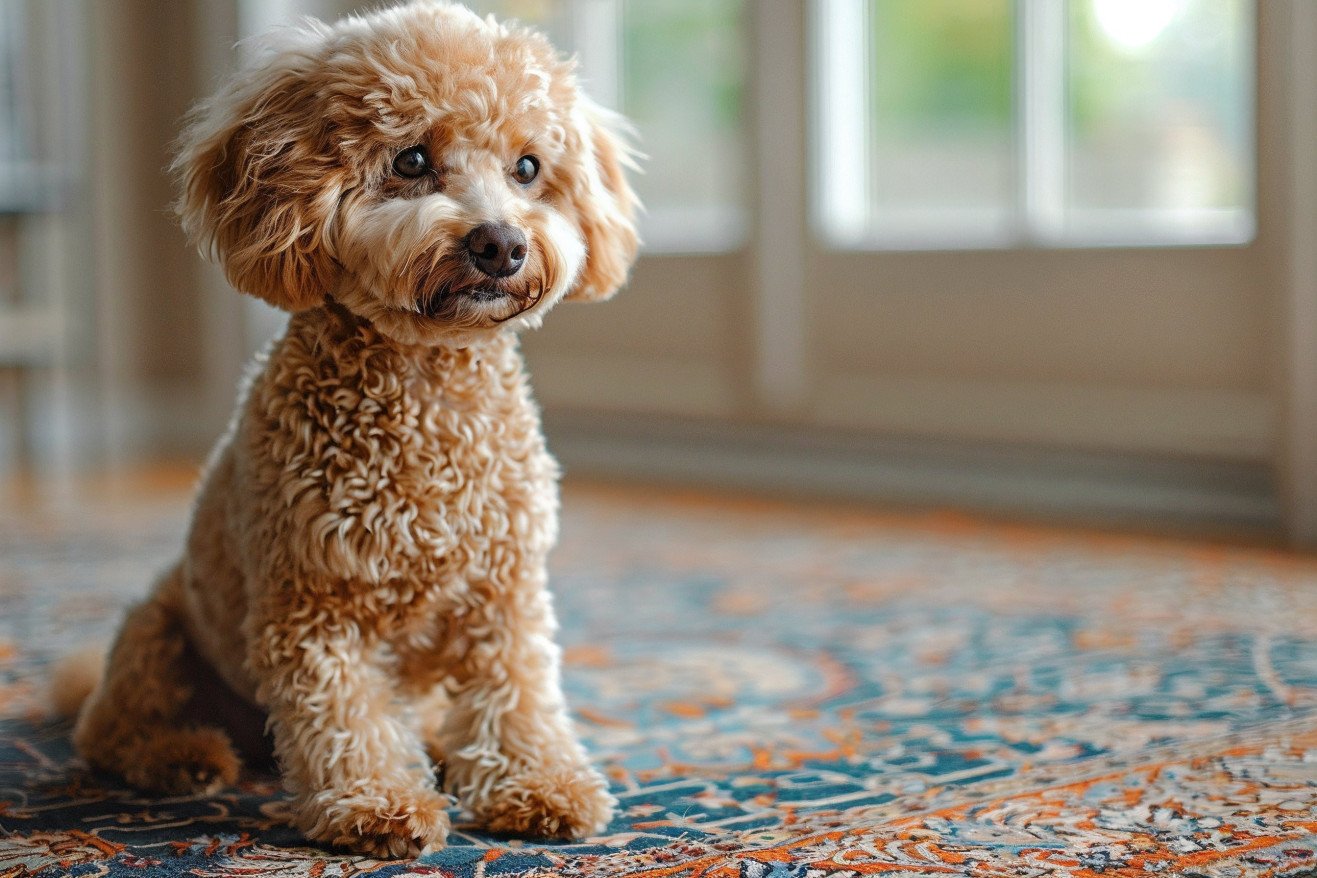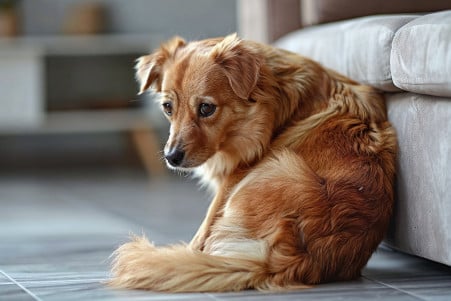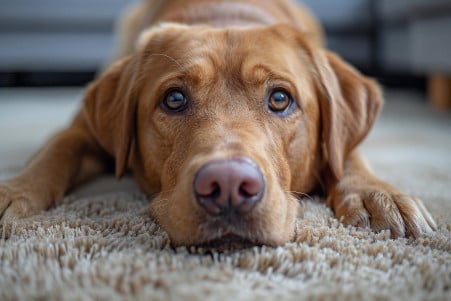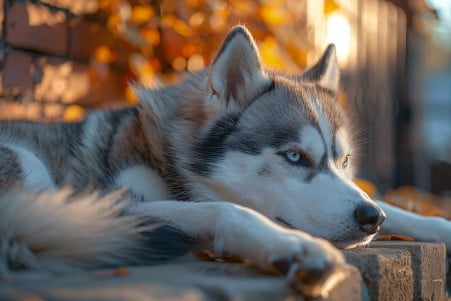Why Do Dogs Rub Their Butts on Carpets? Causes Explained
16 May 2024 • Updated 15 May 2024

If you’ve ever found yourself asking this question, you’re not alone. There are a few different reasons why your dog might be scooting their butt across the floor. It could be due to anal gland problems, worms, diarrhea, or even just a simple case of an itchy bottom due to a buildup of dirt and moisture. However, if it continues, it’s probably best to take your dog to the vet to make sure there isn’t a more serious issue at play.
While it may be funny to watch at first, we’re going to take a closer look at the science behind why dogs rub their butts on carpets. From the physical (like dog anatomy) to the mental (like the emotional state of dogs), knowing why your dog is doing this will help you better understand what they need. We’ll also go over some of the health issues that you should be aware of and some of the more innocent reasons why your dog might be scooting their butt across the floor.
Why do dogs rub their butts on carpets?
Anal Sac Disease
Dogs have two small anal glands located on either side of the anus that produce a pungent, fishy-smelling fluid used for scent marking. If these glands become impacted or infected, it can cause significant discomfort and lead to scooting behavior as the dog tries to find relief.
Other signs that a dog is suffering from anal sac disease include licking or biting at the area, and a fishy smell around the back end. The PDSA also notes that dogs may show signs of discomfort when passing a stool, suddenly sitting down as if in pain, and looking or sniffing around their back end.
There are certain breeds that are more likely to develop anal sac disease. This includes small breeds like Chihuahuas and French Bulldogs, and dogs with a lot of hair around their back end like Poodles. Brachycephalic (short-nosed) breeds like Pugs and Bulldogs are also more likely to develop anal sac disease.
If the anal sacs are impacted or infected, the vet may need to manually express the sacs to remove the fluid. They may also need to prescribe antibiotics or anti-inflammatories to treat an infection or inflammation. In some cases, particularly if the condition is chronic and doesn't respond to other treatments, the anal sacs may need to be surgically removed.
Tapeworms and Scooting
Intestinal parasites, especially tapeworms, can cause anal irritation and scooting in dogs. Per WagWalking, tapeworm segments or eggs can be found in a dog's stool or around the anus, which is a sign of an infestation. Other symptoms of worms include weight loss, vomiting, diarrhea, and a pot-bellied appearance.
A veterinarian will need to prescribe deworming medication to get rid of tapeworms and other intestinal parasites. The Intermountain Pet blog explains that tapeworms will require oral or injectable medication that your vet can administer. Regular preventative deworming and good hygiene can be helpful in preventing future worm infestations.
Diet and Anal Gland Health
While diet doesn't directly cause anal gland problems, it can impact a dog's digestive health and stool consistency, which can then impact the anal glands. WagWalking explains that a high-fiber diet can lead to firmer stools that will press against the anal glands when a dog has a bowel movement, allowing them to empty naturally. The Glandex blog suggests adding fiber-rich foods like pumpkin, sweet potato, and carrots to a dog's diet to increase fiber intake.
Omega-3 fatty acids and anti-inflammatory ingredients such as ginger and turmeric can also help reduce inflammation around the anal glands, according to the Lyka Blog. Meanwhile, the Dog Food Advisor notes that food sensitivities and allergies can cause digestive problems that can then lead to anal gland issues, so an elimination diet may be needed in some cases.
These dietary changes can help improve a dog's anal gland health and potentially reduce scooting. However, it's important to talk to a vet before making any major changes to a dog's diet.
Breed Predispositions and Anal Gland Disorders
There are certain dog breeds that are more likely to develop anal gland disorders. A ground-breaking study by the Royal Veterinary College found that small breeds, including Chihuahuas, Lhasa Apsos, and French Bulldogs, are at an increased risk of anal sac disorders due to their conformation. In addition, brachycephalic (flat-faced) breeds like Pugs and Bulldogs are more likely to develop anal sac disorders.
On the other hand, larger breeds like Boxers and German Shepherds are less likely to develop anal gland disorders. However, The Dog Parent's Guide to Anal Glands points out that anal gland disorders can impact dogs of all sizes. Spaniel-type breeds, Dachshunds, and Poodles may also be predisposed to anal gland disorders because of their body shape and coat type.
The RVC study also found that brachycephalic dogs had 2.62 times the risk of anal sac disorders compared to mesocephalic (medium-faced) dogs. Meanwhile, spaniel-types had 2.09 times the risk, dachshund-types had 1.38 times the risk, and poodle-types had 1.46 times the risk compared to non-breed types. Knowing these breed predispositions can help dog owners stay ahead of potential anal gland issues.
How to Stop and Manage Scooting
If your dog is scooting often, it's important to take them to the vet to make sure there are no underlying health problems. Per The Spruce Pets, when a dog is licking their backside and scooting across the floor, it's often a sign of anal gland impaction, which means that the dog can't express the glands on their own. For less severe cases, Great Pet Care suggests at-home treatments like warm compresses, adding fiber to their diet, and cleaning the area gently.
Learning how to express your dog's anal glands at home can help you manage the issue, but The Wildest warns that you should always consult a professional before trying to express your dog's anal glands at home because if you do it wrong, you can cause irritation. Keeping your dog at a healthy weight, making sure they get enough exercise, and keeping up with their grooming can also help prevent anal gland issues according to Pride and Groom.
If your dog continues to scoot or if scooting is accompanied by other symptoms, you may need to take your dog to the vet for immediate treatment. Make sure to keep an eye on your dog's behavior and take them to the vet when necessary to ensure that they stay healthy.
Conclusion: When to Seek Veterinary Attention
While occasional scooting may be normal, persistent or frequent behavior should be addressed by a veterinarian. Seek prompt medical attention if scooting is accompanied by other symptoms like lethargy, vomiting, diarrhea, or abnormal discharge. If home remedies and management techniques fail to resolve the issue, it's essential to have your dog examined for potential underlying health problems.
Early intervention and proper treatment can prevent anal gland issues from progressing and causing further discomfort or complications. Regular check-ups and open communication with your veterinarian are key to maintaining your dog's anal gland health and overall well-being.


